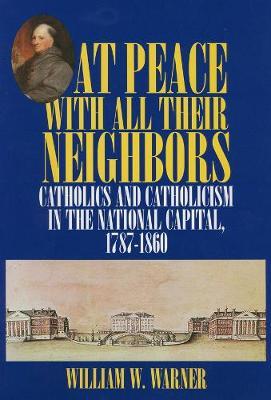Overview
In 1790, two events marked important points in the development of two young American institutions - Congress decided that the new nation's seat of government would be on the banks of the Potomac, and John Carroll of Maryland was consecrated as America's first Catholic bishop. This coincidence of events signalled the unexpectedly important role that Maryland's Catholics, many of them by then fifth- and sixth-generation Americans, were to play in the growth and early government of the national capital. In this book, William W. Warner explores how Maryland's Catholics drew upon their long-standing traditions - advocacy of separation of church and state, a sense of civic duty, and a determination ""to live at peace with all their neighbors,"" in Bishop Carroll's phrase - to take a leading role in the early government, financing, and building of the new capital. Beginning with brief histories of the area's first Catholic churches and the establishment of Georgetown College, ""At Peace with All Their Neighbors"" explains the many reasons behind the Protestant majority's acceptance of Catholicism in the national capital in an age often marked by religious intolerance. Shortly after the capital moved from Philadelphia in 1800, Catholics held the principal positions in the city government and were also major landowners, property investors, and bankers. In the decade before the 1844 riots over religious education erupted in Philadelphia, the municipal government of Georgetown gave public funds for a Catholic school and Congress granted land in Washington for a Catholic orphanage. This book closes with a remarkable account of how the Washington community, Protestants and Catholics alike, withstood the concentrated efforts of the virulently anti-immigrant and anti-Catholic American nativists and the Know-Nothing Party in the last two decades before the Civil War. This chronicle of Washington's Catholic community and its major contributions to the growth of the nations' capital will be of value for everyone interested in the history of Washington, D.C., Catholic history, and the history of religious toleration in America.
Full Product Details
Author: William W. Warner
Publisher: Georgetown University Press
Imprint: Georgetown University Press
Dimensions:
Width: 17.80cm
, Height: 2.50cm
, Length: 25.40cm
Weight: 0.821kg
ISBN: 9780878405572
ISBN 10: 0878405577
Pages: 320
Publication Date: 01 October 1994
Audience:
Professional and scholarly
,
Professional & Vocational
Format: Hardback
Publisher's Status: Active
Availability: Out of stock

The supplier is temporarily out of stock of this item. It will be ordered for you on backorder and shipped when it becomes available.
Author Information
William W. Warner is the author of the Pulitzer Prize-winning Beautiful Swimmers: Watermen, Crabs, and the Chesapeake Bay (Atlantic Monthly Press, 1976; reissued by Little Brown, 1994) and Distant Water: The Fate of the North Atlantic Fisherman (Atlantic Monthly Press, 1983) which was nominated as a distinguished work of non-fiction by the National Book Critics Circle. He formerly was assistant secretary for public service at the Smithsonian Institution.



